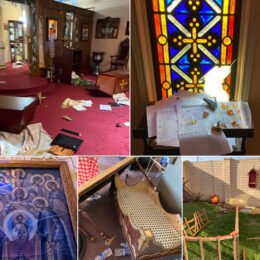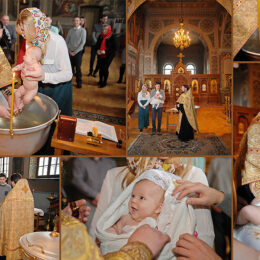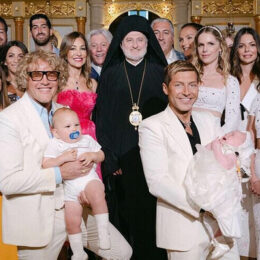Ed. For the most part very accurate.
Washington Post Newsweek Rita Wilson April 9, 2007
Once every few years, Greek Easter falls the same week as “American Easter,” as it was called when I was growing up.
In order for “Greek Easter” to be celebrated the same week as “American Easter,” Passover has to have been celebrated already. We Greeks don’t do Easter until after Passover, because how can you have Easter BEFORE Passover. Jesus went to Jerusalem to celebrate Passover, after all. Unless it is one of the years when the two holidays align. Like this year.
Here are some of the things that non-Greeks may not know about Greek Easter: We don’t do bunnies. We don’t do chocolate. We don’t do pastels.
We do lamb, sweet cookies, and deep red. The lamb is roasted and not chocolate, the sweet cookies are called Koulorakia and are twisted like a braid, and our Easter eggs are dyed one color only: blood red. There is no Easter Egg hunt. There is a game in which you crack your red egg against someone else’s red egg hoping to have the strongest egg, which would indicate you getting a lot of good luck.
Holy Week, for a Greek Orthodox, means you clear your calendar, you don’t make plans for that week at all because you will be in church every day, and you fast. Last year, in addition to not eating red meat and dairy before communion, my family also gave up sodas for the 40-day Lenten period.
During one particularly stressful moment, there were many phone calls amongst our kids as to whether or not a canned drink called TING, made with grapefruit juice and carbonated water was, in fact, a soda and not a juice, which our then 10-year-old decided it was, so we had a Ting-less Lent.
No matter where I find my self in the world I never miss Easter, or as we call it, Pascha. I have celebrated in Paris, London, New York City, Los Angeles, and in Salinas, California at a small humble church that was pure and simple.
When we were kids, our parents would take us, and now as parents ourselves we take our children to many of the Holy Week services including the Good Friday service where you mourn the death of Jesus by walking up to the Epitaphio, which reperesents the dead body of Christ, make your cross, kiss the Epitaphio, and marvel at how it was decorated with a thousand glorious flowers, rose petals and smells like incense.
. . . more




Several observations: Ms. Wilson does a wonderful job of descrbing our tradition with a simply piety that does not partake in anyway of triumphalism.
The one phrase that really struck me was when she described receving Holy Unction she says the priest asks you Christian name. I have forgotten the last time I had heard that phrase or seen it in print. It used to be quite common.
It is apparently quite difficult for many people to accept a simply pious statement of personal belief. For some any statement of firm personal conviction is deemed a tacit criticism of what they believe. The Orthodox legalists were the ones that struck the wrong tone with me, especially the one who merely commented that we Orthodox don’t celebrate Mass but Liturgy.
The article manages to be sweetly moving and has none of the vices which so afllict the Orthodox: ethnic hubris, triumphalism, legalism.
Beautiful story of Faith and very reassuring to know that someone can be at the top of their career and still remain profoundly Orthodox –and still raise their family that way even in Hollywood.
There were those on the other blog that commented that Rita Wilson should have said “Orthodox Easter” and not just “Greek Easter” — but she was describing her own personal experience that did incorporate (small “t”) Greek traditions, and that was just fine . We Orthodox, whether Serb, Russian or Greek all have some traditions that are uniquely “ours”, but we all come together with the (big “T”) Tradition.
Always loved both her and her husband’s work, long before I knew that they were Orthodox. And love them both even more now!
You know Tom and Rita made the Da Vinci Code movie, I would not really call them orthodox or christian.
Guest, I didn’t know they had a hand in the production of the movie. Certainly, Tom Hanks agreeing to act in it was a poor choice indicative of a lack of discernment but the fact of the matter is that most people don’t think theologically outside of Sunday–if then. Does that really mean they are not Christian or Orthodox at all? I don’t think so, just means they have more work to do–just like the rest of us.
I would not really call them orthodox or christian.
The DaVinci Code movie advances a theory that seeks to negate the central message of Christianity – that God so loved the world that he sent his only begotten Son to die on the cross so that human beings could obtain eternal salvation. Instead, the movie suggests that Jesus Christ married Mary Magdalene and settled in the south of France.
So we can only conclude one of two things. People who advance these Pop-Gnostic conspiracy theories either hate Christianity and want to destroy it, or they really haven’t thought deeply enough about their faith and are compartmentalizing their spiritual lives and their professional endeavors rather than allowing the former to influence the later.
The woman who wrote of her love for Greek Easter clearly is not someone who hates Christianity or Orthodoxy. She may be someone, however, who needs to talk to her Priest and learn more about her faith beyond its touching rituals.
Reason cannot replace faith, but the more you think about the Ressurection the more, not less, plausible it becomes.
First, Christ’s actions during that last week in Jerusalem are literally suicidal for and completely inconsistent with someone whose intent was to to escape execution. You do not attack the financial interests of the main Temple, challenge the authority of the leading religious figures of the day, and refuse to defend yourself before the Roman judge, if your plan is to not be Crucified.
Second, the Resurrection was not a later invention of the Church, but was reported almost immediately by Christ’s followers. Saint Paul, whose letters were written before the Gospels, learned of the Ressurection from first hand accounts of people who knew Jesus.
Third, the simple, humble, ordinary people who followed Jesus just do not appear to be either clever, calculating or organized enough to have invented this story. The leader of the Jesus followers after the Ascension was Saint Peter, “The Rock”. Peter, a gentle and slightly confused, bear of a man, is the last person you would think of to concoct a public relations fantasy to advance his career or movement.
Finally, when we last see the frightened, ragtag followers of Jesus after the Crucifixion, they are completely beaten and defeated. Something very powerful must have happened to transform them into the powerful and dynamic group we see at the Pentacost, preaching, winning converts and performing miracles. And, how do you explain the transformation of Saul, proud of his Rabbinical heritage and a particularly determined enemy of the Jesus movement, into Paul, the most articulate, tireless and powerful advocate for Christianity ever?
The only piece of the puzzle remaining that doesn’t come from the historical record is a Loving God working to make it all happen – but when you add that piece, the piece that comes from faith – it all fits together.
Dean, best thing you’ve posted here ever! Thank you. CHRIST IS RISEN!
Note 5. Dean writes:
Faith illumines the nous, the faculty where thought is infused with light — what we might call moral clarity or moral comprehension (not the same thing as moral reasoning). Reason, the Fathers taught, operates by the reflective light of nous, just as the moon and stars emit light reflected from the sun. Thus, if the nous, is darkened, reason will be too. If the nous, is bright, reason will be bright.*
In the English this distinction is not readily available because English has no word to distinguish nous from the generalized term mind. Greek preserves these critical distinctions.
*This is why bright and accomplished people can apply their reason to dark and evil work while believing they are serving a greater good. Think of the early eugenicists or the people decrying the ruling against partial birth abortion today, for example.
I suppose I don’t take the “DaVinci Code” all that seriously, nor think it has any real impact in the culture – other than being a media ‘event’ so that the usual fault lines in the culture can once again declare their position.
That’s why I enjoyed the movie, though I would never bother reading the book. The twists and turns of this fiction was entertaining. Really, there are much more important fish to fry (like abortion, for example)…
Dean writes: “The DaVinci Code movie advances a theory that seeks to negate the central message of Christianity . . . ”
I don’t have a problem with that per se. If someone wants to argue against traditional Christianity on the basis of valid historical research, fine. The problem with the book and movie is that they are based on “history” that is demonstrably false — not false because they contradict some cherished theology, but false because the central claims are based on “events” that are known to be untrue.
Just as faith illuminates thought, fear of faith can create confusion and promote ignorance. An example of misguided scholarship that suffers from fear of faith is the work of the Jesus Seminar, a panel of New Testament scholars (probably too lofty a term) who have edited the Gospels to take out everything that cannot be confirmed using present day scientifc or historical research techniques.
The Jesus Seminar has actually rated the individual Gospel quotations of Christ according to whether the group thinks Christ really did say it, probably said something similar, did not say it but expressed a similar idea, or did not say it at all. The Gospel of Thomas, which is heavily influenced by Gnosticism, is used as an independent source to either corroborate or discredit information in the other four Gospels
The research of the Jesus seminar is flawed because it begins with a predetermined idea or conception of who Jesus Christ was, and then sifts the evidence to retain only that information that supports that pre-determined conclusion.
More importantly their approach fundamentally changes who Christ was and the meaning of what He said. Instead of the Savior who gave His life on the Cross for the redemption of mankind, we are left with a sort of mystical, hippy-dippy wise-man, eating and drinking with outcasts and impressing people with his radical ideas about the poor and cosmic justice.
My biggest objection to the work of the Jesus Seminar is it’s attempt to “sanitize” the Gospels of the idea that there is a powerful God in heaven who loves us and working to save us. I read one of the books of John Dominic Crossan, one of the leaders of the Jesus Seminar. It was filled with lots of useful historical information about ancient Palestine. After reading it, however, I was just left an empty feeling.
Dean writes: “An example of misguided scholarship that suffers from fear of faith is the work of the Jesus Seminar, a panel of New Testament scholars (probably too lofty a term) who have edited the Gospels to take out everything that cannot be confirmed using present day scientific or historical research techniques.”
I don’t know if it’s a fear of faith. The JS have certain criteria for determining the likelihood of sayings or actions in the gospels being authentic. So the issue is whether the methodology leads to sound historical conclusions, not whether the methodology promotes faith or follows from faith. And not all scholars agree with the methodology on historical grounds. For example, Luke Johnson says (my interpretation of him, anyway) that the gospels have a narrative structure that makes them coherent wholes. He says that when you read the gospels a picture of Jesus, a real person emerges. But when you look at the gospels as an assemblage of various fragments, in which the first half of verse X is authentic, but the second half isn’t, the narrative structure is destroyed. And once the narrative structure is gone, the coherence is gone. And what follows from that is — everything. Jesus was married. He wasn’t married. He was straight; he was gay. He was a real person; he was a composite of Mithras, Horus, Perseus, and various other mythological characters. He spoke in the style of an itinerant Jewish apocalyptic preacher; he spoke in the style of a Greek peripatetic philosopher. And so on.
But in a sense, the gospels tend to invite a Jesus Seminar-style analysis. We know that they weren’t eyewitness accounts. We know that the synoptic gospels were made up of various different sources, and that it is possible to see the seams of how those sources were assembled. So it certainly is not inappropriate to try to understand how all of that worked.
Dean: “The research of the Jesus seminar is flawed because it begins with a predetermined idea or conception of who Jesus Christ was, and then sifts the evidence to retain only that information that supports that pre-determined conclusion.”
There’s a lot of that going around on both sides of the issue.
Dean: “More importantly their approach fundamentally changes who Christ was and the meaning of what He said.”
But I don’t see that as a valid criticism of the method. In other words, you seem to be guilty of the same thing of which you accuse the JS — of beginning “with a predetermined idea of conception of who Jesus Christ was.” Again, a method of historical analysis stands or falls depending on its inherent soundness, not whether it leads to certain cherished conclusions.
Dean: “I read one of the books of John Dominic Crossan, one of the leaders of the Jesus Seminar. It was filled with lots of useful historical information about ancient Palestine. After reading it, however, I was just left an empty feeling.”
Again, that’s not a valid criticism of the method. When doing history there is no guarantee that at the end one will be emotionally or spiritually satisfied.
I also have a problem with the idea of “faith” as applied to historical research. For example, there are things in the gospels that virtually no one doubts — that Jesus spoke Aramaic and possibly Greek, that he was Jewish, that he knew and had a relationship with John the Baptist, that he caused a ruckus in the temple. And so on. No one makes an appeal to faith when it comes to those things. In my observation, people appeal to “faith” when it becomes necessary to fill in the gaps and uncertainties in the historical record, of which there are many. So when the historical evidence is with the believer, the believer appeals to history. When the historical evidence is against the believer or uncertain, the believer appeals to faith. So there is this equivocation in method. Think what you will about the JS, at least they aspire to be consistent.
You believe or you do not. That will determine your conception of Christ.